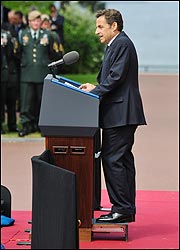The Economist has published its sixth, and presumably final, cover story on Silvio Berlusconi. The headline – ‘That’s all folks’ – is supposed to evoke the cartoon quality of his premiership. But coupled with a backdrop of Sil set in a painting of end-of-Empire Roman lassitude, it is too busy. Far more visually effective was the June 2011 cover with a simple photo of Sil and the line ‘The man who screwed an entire country’.
I haven’t been the biggest fan of The Economist’s coverage of Italy because it has focused so overwhelmingly on Sil — rather than on a the malaise of an entire professional class which he symbolises. What sets Italy apart is that, relative to its level of economic development, it has the most backward, self-serving professional class and professional institutions of any state in the world. This includes, but is far from limited to, its political and legal and fiscal institutions.
There is also a very English undercurrent of hypocrisy in the manner in which the British elite discusses the Italian crisis with a told-you-so attitude. The Economist is particularly guilty of this, putting the boot in to the German response to the crisis on a weekly basis.
What is forgotten is how the Germans are left to do the political heavy lifting in Europe almost single-handedly. They have a French ‘assistant’, but he is barely worthy of the name.
If Britain had joined the Euro, things would have been different. There would be two big political grown-ups in the Euro-zone instead of one, and that would have made the job of dealing with Italy so much easier.
You cannot argue with Britain’s decision to stay out of the Euro from a selfish, pragmatic perspective, but anyone who supported that decision should limit themselves when yelling from the sidelines about what to do now. How would you like to be Merkel, put in a team with Sarko, and expected to sort out Greece and Italy?
If Britons are honest, they must concede that post-war Germany has done the bulk of the work in creating a stable, prosperous and progressive Europe while the British — famed as people of action — stood around bitching. And when Britain realised it desperately needed to be inside the Common Market in the early 1970s, it needed German support — against French opposition — to get in.
Germany, not Britain, is the moral leader of Europe in the past half century.





